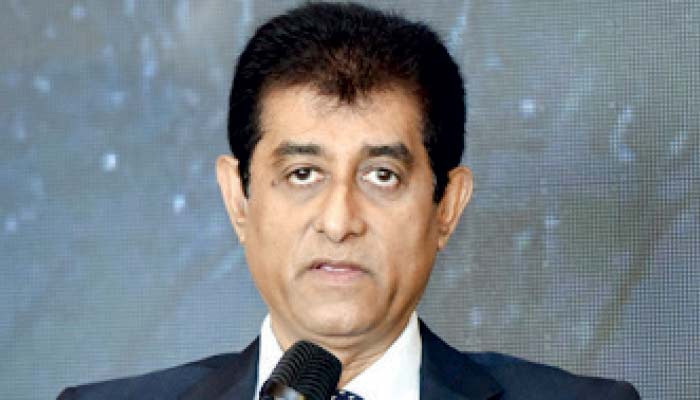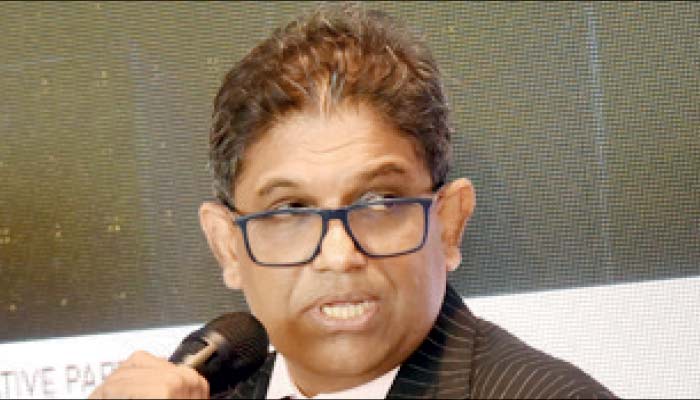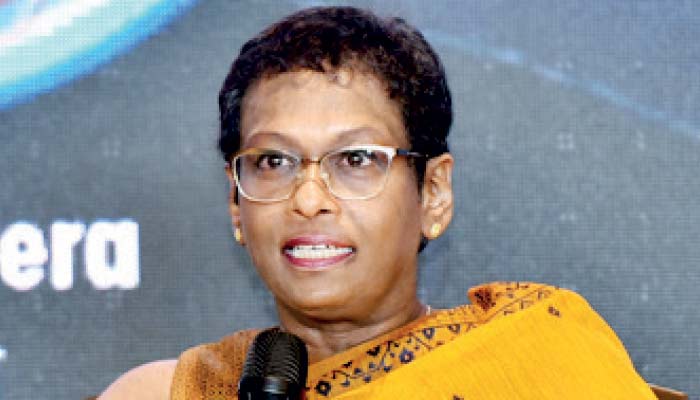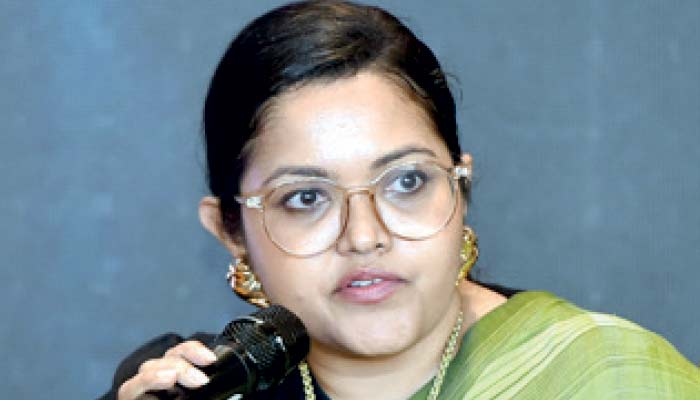Saturday Feb 21, 2026
Saturday Feb 21, 2026
Wednesday, 12 November 2025 03:19 - - {{hitsCtrl.values.hits}}
By Charumini de Silva
|
Treasury Secretary Dr. Harshana Suriyapperuma
|
Treasury Secretary Dr. Harshana Suriyapperuma yesterday declared that the economy has transitioned from crisis to stability and is now poised for sustained growth, driven by a 7% medium-term GDP target underpinned by six key strategies.
Speaking at the Daily FT-University of Colombo MBA Alumni Association and sponsored by Standard Chartered Bank with the creative partnership of Ogilvy Digital at ITC Ratnadipa, Colombo, he said the 2026 Budget was crafted after wide consultation with stakeholders to restore investor confidence, ensure transparency in public finance and build an economy capable of long-term, broad-based growth.
He noted that the country’s economic landscape has “stabilised significantly” after years of turbulence, allowing the Finance Ministry to present “a confident, forward-looking Budget” focused on governance, fiscal discipline and growth.
“Instead of a country buried in corruption, there is governance. Instead of lawlessness, the rule of law is prevailing,” he said, describing the 2026 Budget as one designed to “take the country to the next phase of growth.”
Dr. Suriyapperuma outlined six key strategies driving the Government’s medium-term vision which include; inclusive growth, export diversification, sustainability in policy, production economy, rural development and digital transformation.
“These strategies converge to create the ecosystem for Sri Lanka to move from recovery to expansion,” he added, reiterating the goal of achieving over 7% GDP growth in the medium to long term through consistent and coordinated policy action.
Highlighting a return of market confidence, Dr. Suriyapperuma pointed out that the reserves have strengthened even after reopening vehicle imports. “The move demonstrates the resilience of the market and confidence of businesses,” he added.
The Treasury Secretary also cited the Colombo Stock Exchange’s record highs as a sign of renewed investor optimism. “The same shares that were sold at one-third the price two to three years ago, now trade three times higher, the difference is confidence,” he observed, attributing this to fiscal prudence and adherence to financial discipline.
The Treasury, he said, has ensured that public finance regulations are enforced and that transparency has improved through publicly available frameworks like the Medium-Term Debt Management Strategy.
“We are very confident about debt sustainability,” he stressed, noting that foreign debt repayments began in 2024 and are continuing smoothly.
“By 2028, Sri Lanka will be on a strong footing, having met its obligations through multilateral and bilateral arrangements,” he expressed confidence.
Affirming the Government’s “zero tolerance for corruption”, Dr. Suriyapperuma said governance reforms have already begun delivering tangible outcomes. “For the first time, independent directors have been appointed to State-owned banks through an open, merit-based process managed by an external agency and vetted by an expert panel. This brings independence, accountability and professionalism into the management of State-Owned Enterprises (SOEs),” he elaborated.
He also disclosed that the forthcoming SOE Holding Company Law will institutionalise this governance model, making SOEs more transparent and performance-driven.
The Treasury Secretary said several key legislative amendments and new acts are being prepared, with some to be presented to Parliament before year-end and others in early 2026. “These reforms are about unlocking SOEs’ full potential, providing accountability and ensuring they operate on par with the private sector,” he noted.
Dr. Suriyapperuma reiterated that inclusive growth is the first of the six strategic pillars. The Government’s approach, he said aims to ensure that the benefits of growth reach beyond city limits through rural entrepreneurship support, women’s economic participation and social reintegration of vulnerable communities, including families affected by the drug crisis.
He also cited Budget allocations to education and connectivity, including investment in schools, universities and infrastructure to prepare future generations for the digital economy. “Children from Aswesuma beneficiary families at school and university age will be provided data access to explore knowledge and connect with the world, with safeguards,” he said, describing it as a step toward building an “inclusive digital generation.”
Noting that digitisation is a cornerstone of the Budget, he said it is being fast-tracked through the Electronic National Identity Card (eNIC), expected to launch next year and the National Single Window system for trade facilitation.
He added that the Government is also implementing a three-stage digital invoicing system integrating businesses into a unified tax reporting framework. “Under the first phase exporters will be registered by end-2025, then in the second phase VAT-registered entities will be included and in the final phase comprehensive e-invoicing for all sectors,” he said, confirming that testing for first phase has been successfully completed with strong private sector participation.
Dr. Suriyapperuma said to encourage small transactions and formalise the economy, the Government will absorb the cost of QR transactions under Rs. 5,000. Additionally, a $ 5 million Digital Innovation Fund has been allocated to accelerate investments in emerging tech and digital startups, aiming for 100% national high-speed digital coverage.
On taxation, the Treasury Secretary said the VAT threshold reduction was necessary to widen the tax base and formalise informal businesses. “VAT was being collected below the threshold illegally, so bringing them into the reporting culture is essential,” he explained, noting that transition support will be provided to impacted SMEs.
He also stressed that tax consistency remains central to policy with “no major deviations” have been made to rates or directions to ensure predictability for investors.
Dr. Suriyapperuma said major attention in the Budget is being given to roads, ports and domestic airports development and expansion, especially to support tourism expansion.
“We expect the tourism sector to move into greater heights, with improved domestic airport infrastructure leading to higher occupancy in hotels, both in cities and outside,” he said.
He said the country’s long-term vision extends beyond its 22 million population, focusing on integrating with global markets through new and restructured Free Trade Agreements (FTAs). “A dedicated team has been appointed to review existing FTAs and explore new opportunities,” he confirmed.
Dr. Suriyapperuma ended his address on an optimistic note, asserting that the combination of fiscal discipline, structural reform, digital transformation and inclusive policy will enable Sri Lanka to rise again. “The vision is clear, the roadmap is real and implementation is already happening on the ground. With your support, collectively we will achieve 7% growth and ensure prosperity for all,” he said.
– Pix by Upul Abayasekara and Ruwan Walpola

 Hulangamuwa says 2026 Budget restores private sector’s role as “engine of growth”
Hulangamuwa says 2026 Budget restores private sector’s role as “engine of growth” Standard Chartered CEO hails ‘doable’ Budget 2026
Standard Chartered CEO hails ‘doable’ Budget 2026 Challenging revenue targets for 2026 amid rigid spending and weak welfare coverage: Economist
Challenging revenue targets for 2026 amid rigid spending and weak welfare coverage: Economist Selyn warns of policy and access disconnect for SMEs
Selyn warns of policy and access disconnect for SMEs